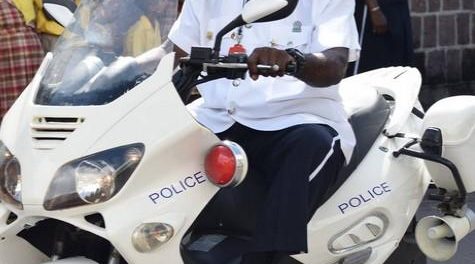RSCNPF HIGH COMMAND SHARES INFORMATION ON TRAFFIC LAWS AND VEHICLE REGISTRATION SYSTEM
Get our headlines on WHATSAPP: 1) Save +1 (869) 665-9125 to your contact list. 2) Send a WhatsApp message to that number so we can add you 3) Send your news, photos/videos to times.caribbean@gmail.com

It is with deep regret that the High Command of the Royal St. Christopher and Nevis Police Force has come to learn of several inaccurate statements made during a recent press conference related to a matter in which an Officer was arrested and charged for the offences of Driving Without a Valid and Unexpired Driver’s Licence and Driving Without Insurance. However, as regrettable as it is, the High Command sees this as an opportunity to educate the public about the law and certain procedures relevant to the matter.
1) Driving Without a Valid and Unexpired Driver’s Licence is an offence that attracts a ticket, however, given the gravity of the offence of Driving Without Insurance, the laws of the land allow for persons to be arrested and charged for that offence. In the Report of Arrests, Convictions and Other Activities published weekly by the Royal St. Christopher and Nevis Police Force, persons have been listed, time and again, for having been arrested and charged for the offence. This is nothing new. As a matter of fact, while the penalty for the offence of Driving Without a Valid and Unexpired Driver’s Licence carries a small fine, the offence of Driving Without Insurance has stiffer penalties. The Motor Vehicles Insurance (Third-Party Risk) Act, Section 3(2) states that “If a person acts in contravention of this section, he or she shall be liable, on summary conviction, to a fine not exceeding one thousand five hundred dollars or to imprisonment for a term not exceeding three months or to both such fine and imprisonment and a person convicted of an offence under this section shall (unless the Court for special reasons thinks fit to order otherwise and without prejudice to the power of the Court to order a longer period of disqualification) be disqualified from holding or obtaining a driver’s licence under the Vehicles and Road Traffic Act, Cap. 15.06 for a period of twelve months from the date of the conviction.”
2) Warrants are used for arrests in minor offence cases. The Police have the power of arrest in matters that are considered a felony. Where misdemeanour matters are concerned, warrants are used. This too is nothing new.
3) Section 5 of The Vehicle and Road Traffic Act (2009) speaks to the Duties of Licensing Officers. It states that, “It shall be the duty of the Licensing Officers, on behalf of the Licensing Authority and in accordance with the provisions of this Act, (a) to issue licences and certificates of registration in respect of vehicles, drivers’ licences and conductors’ licences; (b) to keep a register of (i) registered motor vehicles; (ii) licensed motor vehicles and trailers; (iii) licensed motor drivers and licensed conductors; (c) to perform all such other duties as are or may be conferred or imposed upon him or her by this or any other Act or by any regulations made thereunder or by the Licensing Authority.” The Police are the custodians of the Vehicle Registration System (VRS) in which the register of licensed motor vehicles and trailers, as well as, licensed motor drivers and conductors are kept. This system is accessed only by the Police. It is used by Officers during patrols and vehicle check points and it allows Officers to check the status of a driver at any time. It is also used when drivers are suspected of not having the appropriate licences and documents. As such, a driver does not have to present a licence for the Police to be able to verify that they, in fact, are the holder of a valid and unexpired driver’s licence. However, the burden of proof is on the driver to prove that his/her licence is valid and unexpired. It is important to note here that there is an information-sharing arrangement between the Inland Revenue Department (IRD) and the Police (as there is with many government agencies). The IRD collects the data on vehicles and drivers on behalf of the Licensing Authority. Additionally, staff at the IRD have been appointed as Licensing Officers by the Licensing Authority. Notwithstanding this, the VRS is separate and apart from the Inland Revenue Database. This system has been in place for several years now and is also nothing new.
– END –
Leave a comment
You must be logged in to post a comment.